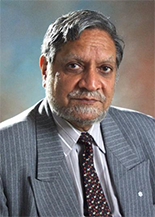Special Interview with Prof. Naranjan S. Dhalla: RCM Journal Editorial Board Member and World's Top 0.05% Scholars
30 May 2025
We are honored to have the opportunity to interview Prof. Naranjan S Dhalla, a distinguished figure in the field of cardiovascular research. This interview provides a comprehensive look at his scientific endeavors, academic values, and perspectives on the future of cardiovascular research.
Editorial Board Introduction
Naranjan S. Dhalla

Prof. Naranjan S. Dhalla is a distinguished professor at the University of Manitoba and Director of Cardiovascular Developments at St. Boniface Hospital Research Centre in Winnipeg, Canada. A globally recognized leader in experimental cardiology, he has published over 880 research articles and trained more than 160 fellows. He has served as President of the International Society for Heart Research and is Honorary Life President of the International Academy of Cardiovascular Sciences. His contributions have earned him over 220 awards worldwide, including the Order of Canada and induction into the Canadian Medical Hall of Fame.
In recognition of his lifelong contributions to medical science, ScholarGPS has named him one of the 2024 Highly Ranked Scholars – Lifetime in the Field of Medicine, placing him in the top 0.05% of scholars worldwide for exceptional productivity, noteworthy impact, and the quality of his scholarly work.
Q1: Could you briefly introduce the main areas of your research?
Prof. Dhalla: My research covers several key topics, including diabetic cardiomyopathy, ischemic heart disease, and heart failure. I focus on molecular and cellular mechanisms, particularly the regulation of calcium (Ca²⁺) transport systems. Additionally, my work investigates the role of vasoactive hormones and signal transduction mechanisms, as well as the effects of oxidative stress and intracellular Ca²⁺ overload on cardiovascular function.
Q2: What are the primary directions of your current research?
Prof. Dhalla: We are exploring combination therapies aimed at modifying defects in signal transduction pathways associated with heart disease. Additionally, my team is investigating therapeutic strategies to prevent alterations caused by oxidative stress, inflammation, and mitochondrial Ca²⁺ overload. By targeting these mechanisms, we hope to develop more effective treatments for cardiovascular conditions.
Q3: How do you envision the future of your research field in the next 5–10 years?
Prof. Dhalla: Two areas that I am particularly focused on for future research are sudden cardiac death and the oxidation products of catecholamines, as well as the interactions of angiotensin receptors in both healthy and diseased states. These topics hold great potential for revealing new insights into cardiovascular pathology and for improving patient outcomes.
Q4: In your view, what are the most important factors in ensuring the reliability and reproducibility of scientific data in cardiovascular research?
Prof. Dhalla: In my view, the reliability and reproducibility of scientific data fundamentally depend on the honesty, integrity, and ethical conduct of everyone involved in the research process—be it students, postdoctoral fellows, or other laboratory scientists. No matter how advanced the techniques or methods are, meaningful and trustworthy scientific outcomes can only be achieved in an environment grounded in personal accountability and scientific integrity.
Q5: What do you believe is necessary to stay at the forefront of research?
Prof. Dhalla: Achieving cutting-edge knowledge requires a high level of commitment and sincere dedication. Conducting research demands perseverance, and only through continuous effort can meaningful progress be made.
Q6: Looking back on your academic and professional career, what achievements are you most proud of?
Prof. Dhalla: I have always had a great passion for training young scientists and promoting the scientific basis for the practice of cardiology. Any achievements I have made are largely attributable to my fellows, associates, and colleagues who have worked alongside me throughout my career.
Q7: From your perspective, what qualities make an academic journal outstanding?
Prof. Dhalla: A successful academic journal relies on finding highly accomplished editors and editorial board members, as well as selecting qualified reviewers to evaluate research papers. Additionally, contributors should be treated with great respect to foster an environment of academic integrity and collaboration.
Q8: As an editorial board member, what aspects of submitted manuscripts do you value the most?
Prof. Dhalla: I evaluate research papers based on several important criteria. First, the topic should be innovative and address a meaningful scientific problem. Second, the data must be presented clearly, with well-organized figures and explanations. Third, the paper should clearly describe what was already known, what has been accomplished through the study, and what new insights it offers. These elements help determine the scientific value and impact of the work.
Q9: How do you balance your research, clinical work, and journal editorial work? What are your interests and hobbies outside of your academic work?
Prof. Dhalla: I have been heavily involved in the development and management of Institute of Cardiovascular Sciences, International Society of Heart Research, International Academy of Cardiovascular Sciences and an international journal. I have also enjoyed interactions with my family members, friends, and colleagues throughout my life.
We would like to extend our deepest gratitude to Prof. Naranjan Dhalla for sharing his profound insights and experiences. His dedication to advancing cardiovascular research and mentoring future generations of scientists continues to inspire the scientific community. We look forward to witnessing his ongoing contributions to the field.
Related article:
Endurance Exercise Prevented Diabetic Cardiomyopathy through the Inhibition of Fibrosis and Hypertrophy in Rats:
https://doi.org/10.31083/j.rcm2505173
Outcomes in Catheter Ablation of Sustained Ventricular Tachycardia in Myocarditis Compared with Ischemic Heart Disease:
https://doi.org/10.31083/RCM25604
Heart Rate Variability Analysis in Congestive Heart Failure: The Need for Standardized Assessment Protocols:
